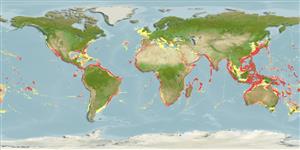分類 / Names
共通名の | 類義語 | Catalog of Fishes(部類, 種) | ITIS | CoL | WoRMS | Cloffa
Environment: milieu / climate zone / depth range / distribution range
生態学
海; 海洋回遊性 (Ref. 51243); 深さの範囲 50 - ? m (Ref. 9340). Subtropical; 27°C - 28°C; 61°N - 51°S, 180°W - 180°E
Atlantic,Mediterranean, Indian and Pacific (Western Central). Eastern Pacific population recognized as subspecies Auxis thazard brachydorax (Ref. 32349).
Many authors have used the name Auxis thazard as including Auxis rochei in the belief that there was only a single worldwide species of Auxis. Highly migratory species.
Length at first maturity / サイズ / 重さ / 年齢
Maturity: Lm 29.5, range 29 - ? cm
Max length : 65.0 cm FL オス/雌雄の選別がない; (Ref. 29114); common length : 60.0 cm TL オス/雌雄の選別がない; (Ref. 47377); 最大公表体重: 1.7 kg (Ref. 40637); 最大記録サイズ: 5 年 (Ref. 29114)
背面の脊椎 (合計) : 10 - 12; 背鰭 (合計) : 10 - 13; 肛門の骨: 0; 臀鰭: 10 - 14. This species is distinguished by the following characters: a robust body, elongated and rounded; teeth small and conical, in a single series; total gill rakers on first gill arch 36-42; dorsal fins 2, D1 X-XII, separated from the second by a large interspace (at least equal to length of first dorsal-fin base), second dorsal fin followed by 8 finlets; anal fin followed by 7 finlets; pectoral fins short, but reaching past vertical line from anterior margin of scaleless area above corselet; a large single-pointed flap (interpelvic process) between pelvic fins; body naked except for the corselet, which is well developed and narrow in its posterior part (no more than 5 scales wide under second dorsal-fin origin); a strong central keel on each side of caudal-fin base between 2 smaller keels. Colour of back bluish, turning to deep purple or almost black on the head; a pattern of 15 or more narrow, oblique to nearly horizontal, dark wavy lines in scaleless area above lateral line; belly white; pectoral and pelvic fins purple, inner sides black (Ref 9684).
Adults are epipelagic in neritic and oceanic waters (Ref. 9340). They feed on small fish, squids, planktonic crustaceans (megalops), and stomatopod larvae (Ref. 5213). Because of their abundance, they are considered an important element of the food web, particularly as forage for other species of commercial interest. They are preyed upon by larger fishes, including other tunas (Ref. 9987). Marketed fresh and frozen (Ref. 9340) and also utilized dried or salted, smoked and canned (Ref. 9987).
Life cycle and mating behavior
成熟 | 繁殖 | 放精 | 卵 | 生産力 | 幼生
In correlation with temperature and other environmental changes, the spawning season varies with areas, but in some places it may even extend throughout the year.
Collette, B.B. and C.R. Aadland, 1996. Revision of the frigate tunas (Scombridae, Auxis), with descriptions of two new subspecies from the eastern Pacific. Fish. Bull. 94(3):423-441. (Ref. 32349)
IUCNのレッドリストの状況は (Ref. 130435: Version 2024-2)
Human uses
水産業: 高い商業の; ゲームフィッシュ: はい
用具
特記事項
XMLをダウンロードして下さい
インターネットの情報源
Estimates based on models
Preferred temperature (Ref.
123201): 13.8 - 27.1, mean 22 °C (based on 986 cells).
Phylogenetic diversity index (Ref.
82804): PD
50 = 0.5625 [Uniqueness, from 0.5 = low to 2.0 = high].
Bayesian length-weight: a=0.00977 (0.00849 - 0.01125), b=3.07 (3.03 - 3.11), in cm total length, based on LWR estimates for this species (Ref.
93245).
栄養段階 (Ref.
69278): 4.4 ±0.4 se; based on diet studies.
Generation time: 1.5 (1.3 - 1.9) years. Estimated as median ln(3)/K based on 18
growth studies.
回復力 (Ref.
120179): 手段, 1.4年~4.4年の倍増期間の最小個体群 (K=0.8; tmax=5; tm=2.5; Fec=200,000 to >1 million).
Prior r = 0.57, 95% CL = 0.37 - 0.85, Based on 4 data-limited stock assessments.
Fishing Vulnerability (Ref.
59153): Low to moderate vulnerability (28 of 100).
Climate Vulnerability (Ref.
125649): Low to moderate vulnerability (28 of 100).
Nutrients (Ref.
124155): Calcium = 200 [57, 445] mg/100g; Iron = 2.61 [0.96, 6.35] mg/100g; Protein = 21.6 [19.6, 23.5] %; Omega3 = 0.324 [0.153, 0.683] g/100g; Selenium = 65.1 [25.8, 204.4] μg/100g; VitaminA = 21.9 [4.9, 83.8] μg/100g; Zinc = 1.2 [0.4, 2.2] mg/100g (wet weight); based on
nutrient studies.
